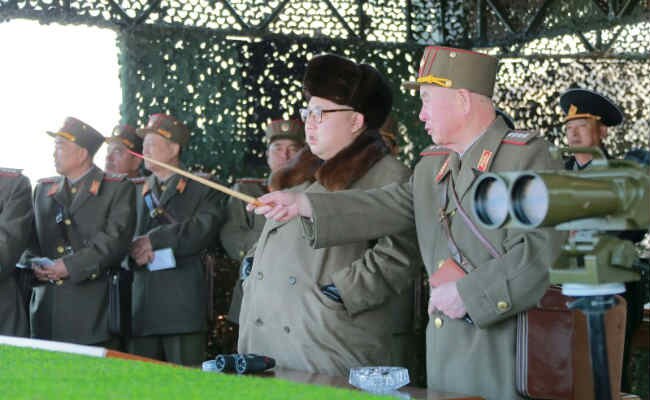
North Korean leader Kim Jong Un watches landing and anti-landing exercises being carried out by the Korean People's Army (KPA) at an unknown location in Pyongyang on March 20, 2016. (Reuters)
Seoul:
North Korea, supervised by leader Kim Jong Un, successfully tested a solid-fuel rocket engine that increased power of the reclusive state's ballistic rockets, North Korea's state news agency reported today.
The claim, if confirmed, could mean the North was continuing to work on an intercontinental ballistic missile (ICBM) programme at a rapid pace, in defiance of UN sanctions that ban such activities.
"(Kim) noted with great pleasure that the successful test ... helped boost the power of ballistic rockets capable of mercilessly striking hostile forces," KCNA news agency said.
The North said last week it had conducted a successful simulated test of atmospheric re-entry of a ballistic missile and the country would soon test ballistic missiles capable of carrying nuclear warheads.Pyongyang has previously launched long-range rockets that used liquid fuel but it was seen to lack the capability to build solid-fuel long-range or intercontinental missiles.
Solid-fuel rockets have advantages in military use, although liquid fuel rockets are considered more sophisticated as their thrust can be controlled in flight.
The North has deployed short and medium-range missiles and test fired them, but never flight-tested the KN-08 ICBM it is believed to be developing.
The KN-08, which has been put on display at military parades and in official news media appears to have a three-stage design that is likely intended to use solid fuel, according to experts.
Despite its boasts to be making progress, many experts believe the North is a decade or more away from building an ICBM capable of threatening the United States.
In recent weeks, the isolated state has stepped up bellicose rhetoric, threatening pre-emptive nuclear strikes against Washington and Seoul.
Last week, the North fired two medium-range ballistic missiles into the sea in defiance of tough new UN and US sanctions slapped on the country following nuclear and rocket tests earlier this year.
It fired short-range rockets into the sea on Monday.
The claim, if confirmed, could mean the North was continuing to work on an intercontinental ballistic missile (ICBM) programme at a rapid pace, in defiance of UN sanctions that ban such activities.
"(Kim) noted with great pleasure that the successful test ... helped boost the power of ballistic rockets capable of mercilessly striking hostile forces," KCNA news agency said.
The North said last week it had conducted a successful simulated test of atmospheric re-entry of a ballistic missile and the country would soon test ballistic missiles capable of carrying nuclear warheads.Pyongyang has previously launched long-range rockets that used liquid fuel but it was seen to lack the capability to build solid-fuel long-range or intercontinental missiles.
Solid-fuel rockets have advantages in military use, although liquid fuel rockets are considered more sophisticated as their thrust can be controlled in flight.
The North has deployed short and medium-range missiles and test fired them, but never flight-tested the KN-08 ICBM it is believed to be developing.
The KN-08, which has been put on display at military parades and in official news media appears to have a three-stage design that is likely intended to use solid fuel, according to experts.
Despite its boasts to be making progress, many experts believe the North is a decade or more away from building an ICBM capable of threatening the United States.
In recent weeks, the isolated state has stepped up bellicose rhetoric, threatening pre-emptive nuclear strikes against Washington and Seoul.
Last week, the North fired two medium-range ballistic missiles into the sea in defiance of tough new UN and US sanctions slapped on the country following nuclear and rocket tests earlier this year.
It fired short-range rockets into the sea on Monday.
© Thomson Reuters 2016
Track Latest News Live on NDTV.com and get news updates from India and around the world

